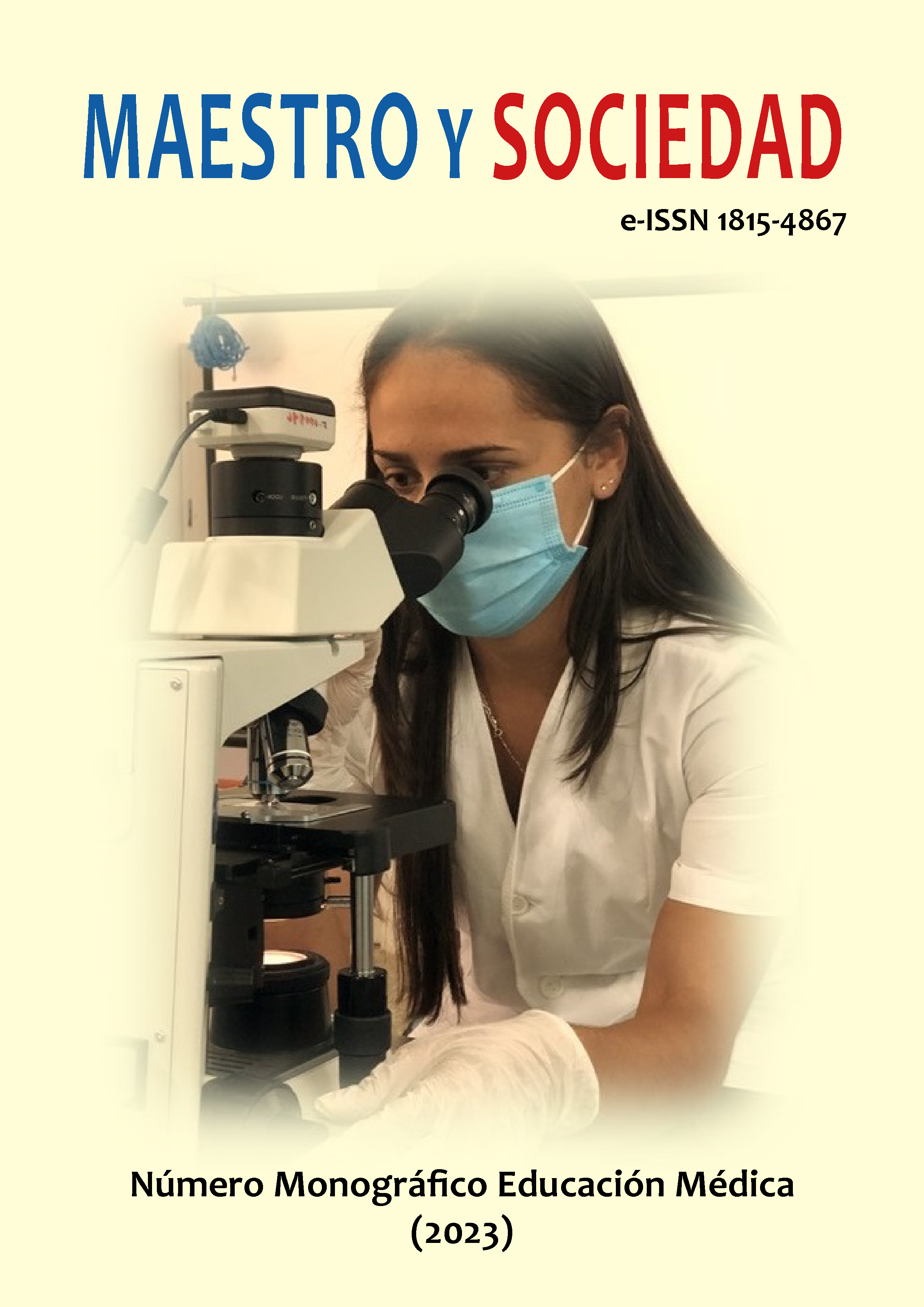Historical trends in research training and development of research skills in medical students
Keywords:
medical students, research training, research skills, historical trendsAbstract
Introduction: Research training is a component of the training process of the modern university, in particular, of Medical
Sciences students, which is why research is incorporated into university study plans and programs. Objective: Characterize
the historical trends of the process of research training and development of research skills in students of the Medicine
career. Material and Methods: For this, the stages of professional training of the Cuban doctor were determined after
the revolutionary triumph, linked to the process of investigative training of the students of the Medicine career in Cuba,
which are identified with historical pedagogical milestones marked by transcendental moments. of the social, cultural and
political evolution of the country and with substantial changes operated in the different models and Study Plans of the Medicine career, as well as theoretical methods supported by dialectical materialism such as: historical-logical, inductiondeduction
were used. and analysis – synthesis. Results: The need to develop investigative skills in students is revealed
from their involvement in: diagnostic discussions, case studies, bibliographic reviews, descriptive studies, among other
biomedical investigations. Discussion: In general, there are still difficulties in the development of the psychopedagogical
diagnosis and the assessment of elements related to the research training of Medicine students. Research carried out by:
Lage, A. (1995); Alvarez and Rojas (2004); as well as Battellino and Guadalupe (2006), emphasize the importance of the
development of undergraduate research not only for the training of the future professional as a researcher, but also for
their contribution to solving health problems and their social impact. Conclusions: Despite the progressive development,
there are still limitations regarding the appropriation and development of knowledge, investigative skills and attitudes
necessary for students and teachers to successfully carry out activities associated with scientific research.
References
Álvarez de Zayas, C. (1995). Metodología de la Investigación Científica. Centro de Estudios de Educación Superior “Manuel F. Gran”.
Carrillo-Larco, R.M. & Carnero, A.M. (2013). Autoevaluación de habilidades investigativas e intención de dedicarse a la investigación en estudiantes de primer año de medicina de una universidad privada en Lima, Perú. Rev. Med. Hered., (24), 17-25. http://web.ebscohost.com/ehost/pdfviewer/pdfviewer?vid=5&sid=2d0c224e-d213-4dfdbdda-1d5c66acc810%40sessionmgr10&hid=120.
Chirino Ramos, M. V. (2002). Perfeccionamiento de la formación inicial investigativa de los profesionales de la educación. [Tesis de doctorado. Instituto Superior Pedagógico Enrique José Varona].
Garrido, C. et al. (2004). Estrategias curriculares para el perfeccionamiento de la formación del médico general básico. Rev Habanera CiencMed; 2(7). http://bvs.sld.cu/revistas/rhab/articulo_rev7/carmen_garrido.html
González Capdevila, O. (2010). Las habilidades investigativas en el currículo de medicina. Una valoración diagnóstica necesaria EDUMECENTRO, 2(2). http://www.revedumecentro.sld.cu/index.php/edumc/article/view/75/153
González N., Garriga, E. & Cuesta Y. (2011). Programa de la asignatura Metodología de la Investigación y Estadística. Universidad de Ciencias Médicas.
Horruitinier Silva, P. (2007). El proceso de formación: sus características. Revista Pedagógica Universitaria.
Lanuez Bayolo M., Pérez Fernández, V. (2005). Habilidades para el trabajo investigativo: experiencias en el Instituto Pedagógico Latinoamericano y Caribeño (IPLAC). IPLAC.
López Balboa L. (2001). El desarrollo de las habilidades de investigación en la formación inicial del profesorado de química. [Tesis Doctoral. Universidad de Cienfuegos Carlos Rafael Rodríguez Cienfuegos].
Machado Ramírez, E. F., Montes de Oca Recio, N., & Mena Campos, A. (2008). El desarrollo de habilidades investigativas como objetivo educativo en las condiciones de la universalización de la educación superior. Pedagogía Universitaria XIII(1), 156-180. http://revistas.mes.edu.cu/Pedagogia-Universitaria/articulos/2008/numero/189408108.pdf
Ministerio de Salud Pública. Universidad de Ciencias Médicas de La Habana. (2019). Centro Rector para Planes y Programas de Estudios en Salud. Plan de Estudio E. Carrera Medicina.
Montes de Oca, N. & Machado E. (2009). El desarrollo de habilidades investigativas en la educación superior: un acercamiento para su desarrollo. Rev Hum Med, 9(1).
Moreno, M.G. (2005). Potenciar la educación. Un currículum transversal de formación para la investigación. Revista Electrónica Iberoamericana sobre Calidad, Eficacia y Cambio en Educación, 3(1), 520-540. http://dialnet.unirioja.es/servlet/articulo?codigo=1130331
Pegudo A. et al. (2012). Estrategia pedagógica para desarrollar habilidades investigativas en asesores de trabajo de investigación científico estudiantiles EDUMECENTRO; 4(1). http://scielo.sld.cu/scielo.php?script=sci_arttext&pid=S2077-28742012000100013&lng=es
Pérez, M. G. (2000). La Investigación Acción como tendencia pedagógica. En C. d. autores, Tendencias pedagógicas en la realidad educativa actual. 105-113. Editorial Universitaria.
Pérez Maya C, López Balboa, L. (1999). Las habilidades e invariantes investigativas en la formación del profesorado. Una propuesta metodológica para su estudio. Pedagogía Universitaria, 4(2), 13-44. http://revistas.mes.edu.cu/Pedagogia-Universitaria/articulos/1999/2/189499202.pdf
Tejeda Díaz, R. (2000). Consideraciones teóricas y metodológicas para una concepción integral del proceso de adquisición de las habilidades. Una propuesta al alcance de usted para debatir y reflexionar. Instituto Superior Pedagógico José de la Luz y Caballero.
UNESCO. (1998). Declaración Mundial sobre la Educación Superior en el siglo XXI: Visión y Acción. http://www.unesco.org/education/educprog/wche/declaration_spa.html
Published
How to Cite
Issue
Section
License
Copyright (c) 2023 Maidilis Beltrán Moret, Odalis Querts Méndez, Katia Aguilera Díaz, Onnis Del Río Pérez

This work is licensed under a Creative Commons Attribution-NonCommercial-NoDerivatives 4.0 International License.
This journal provides immediate open access to its content, based on the principle that offering the public free access to research helps a greater global exchange of knowledge. Each author is responsible for the content of each of their articles.


























 Universidad de Oriente
Universidad de Oriente 